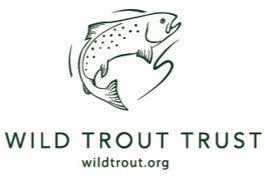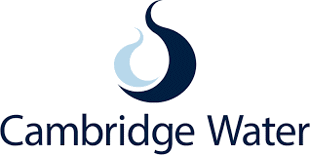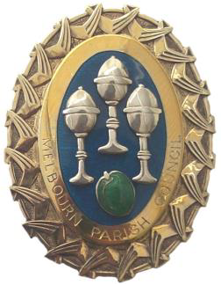News release from: 07/06/2023
Teamwork to restore the River Mel
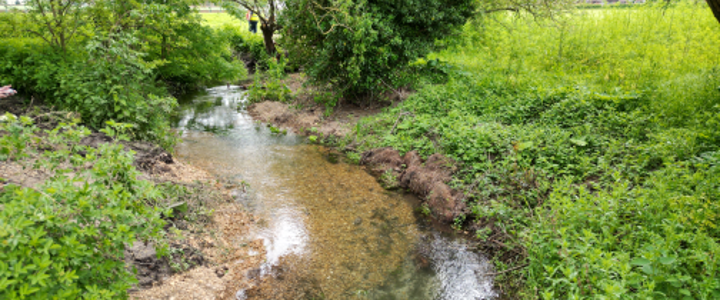
Work to restore the riverbed of a precious chalk stream has taken place under a joint initiative between the Wild Trout Trust, Cambridge Water, South Cambridgeshire District Council and Melbourn Parish Council.
The River Mel is a small chalk stream which supports brown trout and water voles, as well as water crowfoot and starwort. Kingfishers occasionally use the river too.
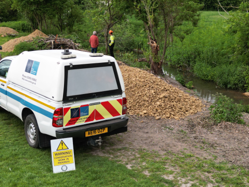
The river has become degraded through low flows, over-shading, and pressure from people in recent years. The River Mel Restoration Group (RMRG) have carried out a great deal of improvement and restoration work during the last decade but in places have found it challenging to maintain all that they have done.
Following scrub and bramble removal in late winter when birds were not nesting to open-up the river, recent work under the supervision of the Wild Trout Trust in Melbourn has seen the careful restoration of the riverbed using a blend of gravel and chalk. The bed now smoothly rises and falls, helping the river to flow at different rates - which increases the range of habitats.
Funding provided from Cambridge Water’s PEBBLE Fund, which was created to encourage and enhance biodiversity in the local environment, was used to purchase approximately 200 tonnes of gravel. Melbourn Parish Council also provided a generous grant for the work.
South Cambridgeshire District Council’s Awarded Watercourses team provided equipment, such as excavators and trailers, and staff, to place the mix of stone sensitively along the riverbed. In particular, the use of the Council’s trailer allowed the gravel to be brought to site as and when required – avoiding the need for it to be stockpiled at Melbourn Recreation Ground. This also kept large lorries away from local schools.
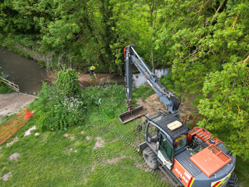
Wild Trout Trust Conservation Officer, Rob Mungovan, said, “This restoration work is starting from the bottom-up. If we can restore the bed of our rivers, then we’re re-creating an important habitat. Riverbeds are where trout spawn, mayflies live, and water weeds grow. Many of our chalk streams have been over-dredged so they are little more than deep silty ditches. We know that this kind of habitat restoration can’t put more, or better quality, water in the river, but it can help to make it more resilient to all its other challenges. This stretch of the River Mel now flows as a bright stream once again.”
John Travis, Parish Councillor for Melbourn, added “Melbourn Parish Council were proud to support this project with a significant financial contribution. This was part of our long-term partnership with Rob Mungovan through the Wild Trout Trust and of course the amazing group of local volunteers who help preserve and improve the River Mel. We are confident that this vital natural resource is in good hands”.
Brown trout need clean gravel and swift water flows in which to spawn. By placing gravel on the riverbed, new spawning areas are created. Also, by raising the bed slightly, the flow velocity is increased which cleanses fine sediment from the bed.
As the river flow is increased it becomes more favourable for plants found in chalk streams, like water crowfoot and starwort. As they become established, they provide further cover for fish, invertebrates, and mammals. The invertebrates play a key role in river ecology by processing nutrients and in turn provide food to larger animals such as fish and birds.
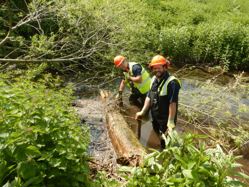
The removal of dense shading scrub and brambles lets light back into the river, allowing low-level vegetation to re-establish, and provides cover for water voles which avoid more shaded areas. Now that the river has been opened-up of scrub and brambles, it is more visible as an attractive part of Melbourn Recreation Ground, and the Wild Trout Trust looks forward to further work with RMRG volunteers on tasks such as adding extra biodiversity to the riverbanks with colourful native plants.
South Cambridgeshire District Council’s Lead Cabinet Member for Environment, Cllr Brian Milnes, commented: “This important project has helped to restore a beautiful natural habitat, and will have significant positive environmental impact for years to come. We’re pleased to have worked alongside the Wild Trout Trust, who have taught our Awarded Watercourses team techniques that will be useful for them elsewhere across the district too. This is incredibly valuable given that we maintain around 275km of awarded watercourses in South Cambs, helping protect the environment and homes. Our Doubling Nature action plan includes a focus on the sensitive management of this vast network of watercourses, helping to enhance biodiversity, so we are delighted to have been able to support local efforts in the River Mel.”
One of the South Cambridgeshire District Councillors for Melbourn, Cllr Jose Hales, said: “Our chalk streams are so precious as is the wildlife around them. We as a community owe such a debt to the River Mel Restoration Group for their year-on-year maintenance of the chalk stream and of course the Wild Trout Trust and Cambridge Water for doing the recent work.”
Caroline Boden, Head of Marketing and Communication at Cambridge Water, added: “We were delighted to be able to support this important project through funding provided by our PEBBLE scheme, which is our biodiversity improvement fund. The impact of water supply and use on the environment remains a key focus for us, and as part of our response to this we're proposing to spend £12m between 2025 and 2030 undertaking further river restoration work on several chalk streams in our area to improve the condition and ecology of these precious watercourses.”
